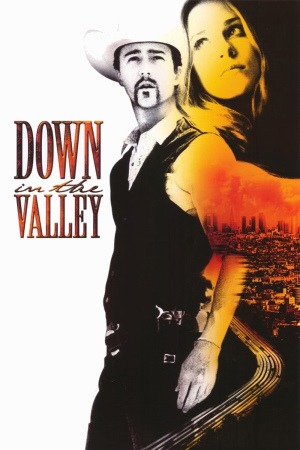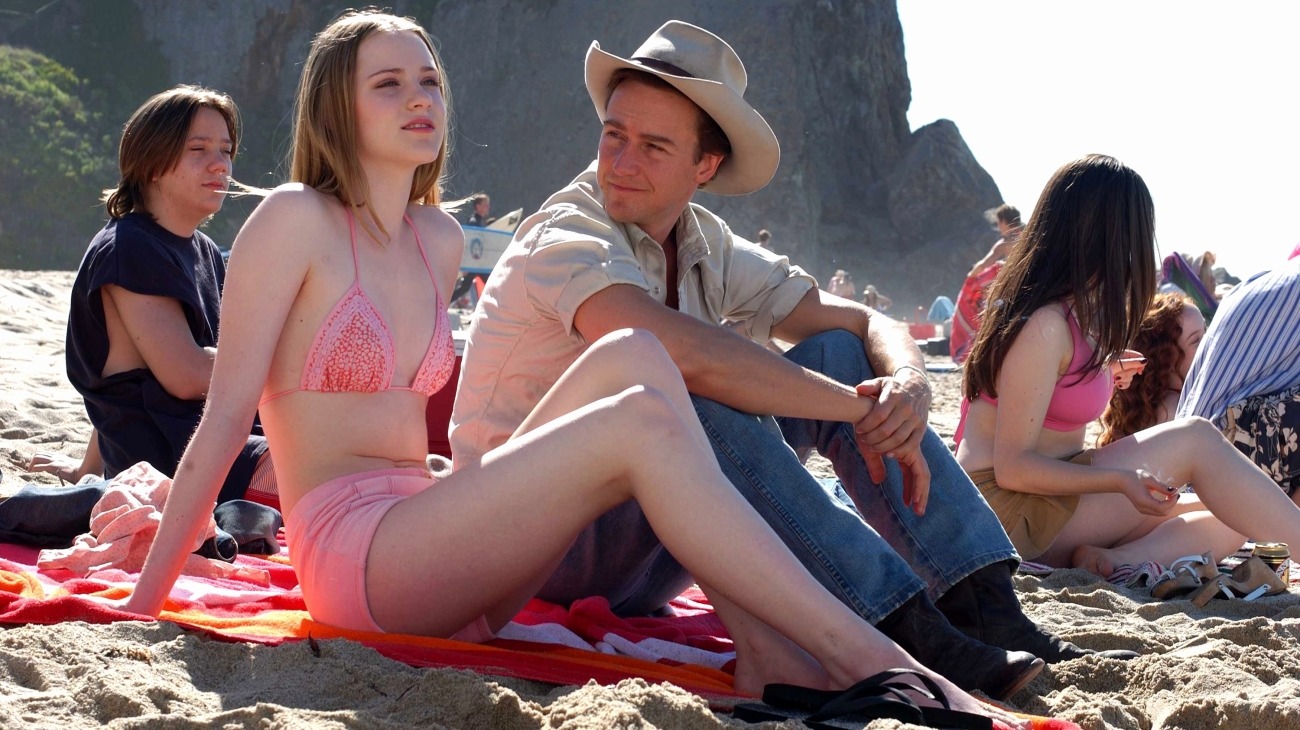
The death of the West(ern)
A question for the ages: is it preferable to see a perfunctory and dull Hollywood blockbuster whose every movie eminently predictable, or an edgy little indie that doesn't play by any rules and goes wildly off the rails at the end, turning into an unwatchable mess?
I don't know if I can answer that. I'd rather see Down in the Valley again than Poseidon, but I'd rather see Mission: Impossible III than either of them. So I guess that there just aren't hard and fast rules.
Down in the Valley was developed at Sundance '05, premiered at that year's Cannes Festival, and only now comes to wide release. So it's got that fine indie story of "little film that couldn't find a distributor until some tiny company had faith" that, frankly, usually doesn't end with a film worth seeing. Of course, "film gets snapped up at Sundance for $5 million in a bidding war" usually doesn't either, so I guess the moral might just be "avoid Sundance-related films that aren't Brick."
The story: Harlan (Edward Norton) is a thirtysomething drifter looking for work in the San Fernando valley. Tobe (Evan Rachel Wood) is a teenager with a douchbag foster father, Wade (David Morse), and a brother, Lonnie (Rory "The Good One" Culkin), who has clearly been traumatized by living with said douchebag. Harlan and Tobe meet, date, fuck, and wonder why Wade has a problem with all this. The audience might forgiven for wondering why he doesn't have more of a problem, because he doesn't seem to mind, per se, the notion of his teenaged ward stepping out with a man twice her age, only that the man is so...odd.
For the first hour and change, I was able to ignore the daft character motivations, and run with the story. The actors are all good, especially Norton (unsurprisingly), and both he and Wood do a good job of selling a most irrational relationship in such a way that I could believe that yeah, neither of them would see what's so weird about it. The film is told primarily from Harlan's perspective, and Norton does fine work with showing us the fragility of his character's mind, how he's lost in fantasy, and how it never occurs to him that the real world might have objections.
The last forty minutes are a disaster, though. Writerly ethics forbid me from mentioning the inevitable twists (some of which are predictable, some of which are so predictable that I couldn't imagine the film going there, if that makes sense), but they don't work. The film goes from a symbolic plot to pure Symbolism, character cease entirely to make sense, and the film becomes unendurably long.
When I talk about symbolism, I refer to the film's relationship to the Western genre. Harlan fancies himself a cowboy, you see, and writer/director David Jacobson takes great pains to show us that this is because Harlan is obsessed with the iconography of western films. I should mention in praise that this is done without any overt reference to any genre films, although there is a pair of overlong sequences that are embarassingly derivative of Taxi Driver and the "you talkin' to me?" scene, of all things. Coupled with the setting in Los Angeles and environs, the film can only be seen as a commentary on/critique of the Hollywood mythology factory. But as the film unspools (I do not say "progresses") this moves from subtle and intriguing to lumpen and overt. By the climax of the film, in the middle of a Western movie set, I was all but groaning out loud.
This is not Jacobson's first film (he directed 2002's Dahmer), but I did not know that at the time, and I feel justified. Perhaps because he himself lost interest in the overbaked story, the film is not just shot but Shot! with what I can only call "film school" compositions; shots framed not because the story requires that they be framed that way, but because they provide striking and "cool" visuals. And in the abstract, there are some beautiful geometric objects in the movie, but given that this is a narrative and not an experimental film, I can only look at this as a result of the general lack of discipline Jacobson exerts over the project. It feels like the work of someone who had no idea why not to do things. In this, I suppose, it is an exemplar of the worst excesses of the American indie community.
5/10
I don't know if I can answer that. I'd rather see Down in the Valley again than Poseidon, but I'd rather see Mission: Impossible III than either of them. So I guess that there just aren't hard and fast rules.
Down in the Valley was developed at Sundance '05, premiered at that year's Cannes Festival, and only now comes to wide release. So it's got that fine indie story of "little film that couldn't find a distributor until some tiny company had faith" that, frankly, usually doesn't end with a film worth seeing. Of course, "film gets snapped up at Sundance for $5 million in a bidding war" usually doesn't either, so I guess the moral might just be "avoid Sundance-related films that aren't Brick."
The story: Harlan (Edward Norton) is a thirtysomething drifter looking for work in the San Fernando valley. Tobe (Evan Rachel Wood) is a teenager with a douchbag foster father, Wade (David Morse), and a brother, Lonnie (Rory "The Good One" Culkin), who has clearly been traumatized by living with said douchebag. Harlan and Tobe meet, date, fuck, and wonder why Wade has a problem with all this. The audience might forgiven for wondering why he doesn't have more of a problem, because he doesn't seem to mind, per se, the notion of his teenaged ward stepping out with a man twice her age, only that the man is so...odd.
For the first hour and change, I was able to ignore the daft character motivations, and run with the story. The actors are all good, especially Norton (unsurprisingly), and both he and Wood do a good job of selling a most irrational relationship in such a way that I could believe that yeah, neither of them would see what's so weird about it. The film is told primarily from Harlan's perspective, and Norton does fine work with showing us the fragility of his character's mind, how he's lost in fantasy, and how it never occurs to him that the real world might have objections.
The last forty minutes are a disaster, though. Writerly ethics forbid me from mentioning the inevitable twists (some of which are predictable, some of which are so predictable that I couldn't imagine the film going there, if that makes sense), but they don't work. The film goes from a symbolic plot to pure Symbolism, character cease entirely to make sense, and the film becomes unendurably long.
When I talk about symbolism, I refer to the film's relationship to the Western genre. Harlan fancies himself a cowboy, you see, and writer/director David Jacobson takes great pains to show us that this is because Harlan is obsessed with the iconography of western films. I should mention in praise that this is done without any overt reference to any genre films, although there is a pair of overlong sequences that are embarassingly derivative of Taxi Driver and the "you talkin' to me?" scene, of all things. Coupled with the setting in Los Angeles and environs, the film can only be seen as a commentary on/critique of the Hollywood mythology factory. But as the film unspools (I do not say "progresses") this moves from subtle and intriguing to lumpen and overt. By the climax of the film, in the middle of a Western movie set, I was all but groaning out loud.
This is not Jacobson's first film (he directed 2002's Dahmer), but I did not know that at the time, and I feel justified. Perhaps because he himself lost interest in the overbaked story, the film is not just shot but Shot! with what I can only call "film school" compositions; shots framed not because the story requires that they be framed that way, but because they provide striking and "cool" visuals. And in the abstract, there are some beautiful geometric objects in the movie, but given that this is a narrative and not an experimental film, I can only look at this as a result of the general lack of discipline Jacobson exerts over the project. It feels like the work of someone who had no idea why not to do things. In this, I suppose, it is an exemplar of the worst excesses of the American indie community.
5/10
Categories: indies and pseudo-indies, westerns






